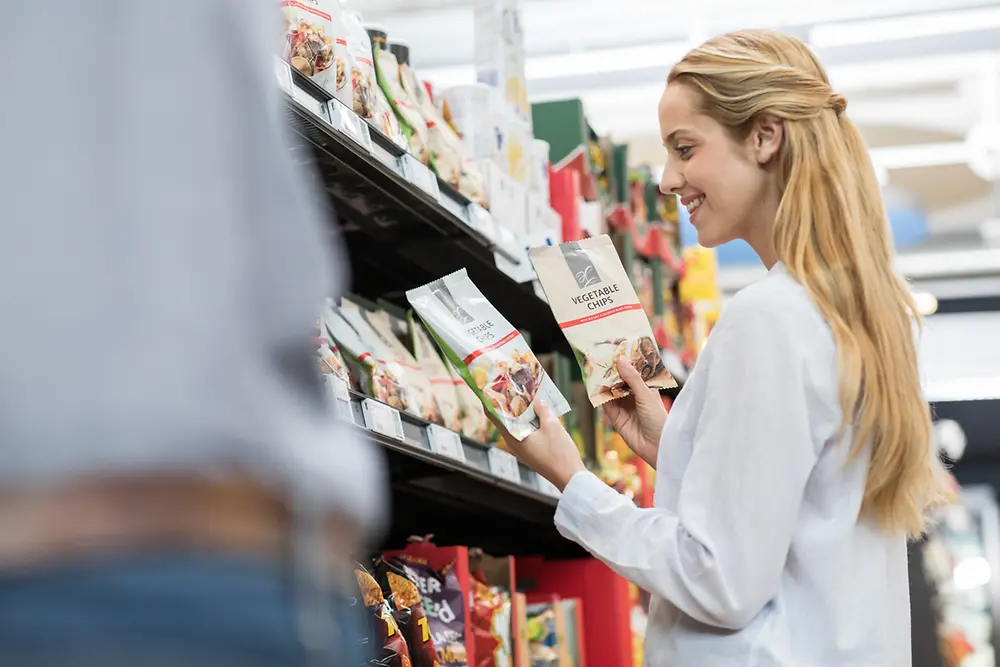Descubra as marcas das nossas dois unidades de negócios Henkel Adhesive Technologies e Henkel Consumer Brands.
10 de mai. de 2022 Düsseldorf / Germany
Designed for recycling: Henkel launches new solutions and receives RecyClass certification
Successfully creating sustainable and recyclable packaging starts during the design phase: The right choice of adhesive significantly influences what can be done with the package at the end of its primary use. With its RE range of adhesives and coatings designed for recycling, Henkel enables packaging to go beyond current functionalities – to create flexible packaging that has recyclability “built in”. Products in this range must fulfill stringent external testing requirements for sustainability.
“The use of certified adhesives according to recognized test protocols is extremely important, as there are differences in the recycled materials in terms of their processability as well as their physical properties,” says Guilherme Fernandes, Senior Manager Product Development Polyurethanes for Henkel Packaging Adhesives. “Ensuring our customers can reach their sustainability goals is one of our top priorities, which is why we work together with independent testing institutions to certify our solutions.”
RE Range expanded with two RecyClass-recognized systems for flexible packaging
Henkel has now expanded the RE Range with two new solvent-free, two-component polyurethane systems. Loctite Liofol LA 7818 RE / 6231 RE and Loctite Liofol LA 7102 RE / 6902 RE, have been designed for use in flexible packaging. The systems have also been recently recognized for recyclability by RecyClass, a comprehensive cross-industry initiative that advances plastic packaging recyclability and ensures traceability and transparency of recycled plastic content in Europe. The organization aims to establish a harmonized approach towards recycled content calculation through activities such as the rigorous scientific testing and certification of innovative materials.
“To receive the RecyClass approval, our innovative solvent-free adhesives were extensively tested in accordance with strict scientific protocols that have confirmed their suitability for the packaging recycling process,” explains Fernandes. “The systems are considered to be fully compatible with polyethylene recycling according to RecyClass laboratory tests conducted by Aimplas in accordance with the Recyclability Evaluation Protocol for PE films.”
Sustainability Meets Efficiency
The latest additions to the RE range ensure improved packaging integrity due to the excellent adhesion to metalized substrates. In addition, both adhesive systems deliver very good performance at the highest machine speeds. Thanks to their easy handling and optimal cleaning possibilities, there are fewer production downtimes. The faster PAA decay ensures a shorter storage time and a reduced risk of complaints compared to conventional adhesives in this segment. In addition to Henkel’s own internal testing and certification capabilities, all applications have been tested by external testing protocols with regards to sustainability.
The two new RE solutions differ primarily in their scope of application. Loctite Liofol LA 7818 RE / 6231 RE has been developed for standard applications, such as dry food, snacks, and confectionery. The solution offers excellent adhesion to metalized substrates. By contrast, Loctite Liofol LA 7102 RE / 6902 RE has been developed for medium performance and barrier films that can endure pasteurization. The product stands out for its versatility, in terms of the different areas of application, which can range from dried food to cheese packaging.
Henkel is the partner for recyclable design
The key to designing sustainable packaging is making sure each component positively contributes to the whole. The selection of adhesives and coatings while creating the design opens up a whole new world of possibilities for brands and packaging designers.
“Adhesives aren’t just adhesives,” says Alexander Bockisch, Head of Market Strategy for Flexible Laminates. “At Henkel, we are a comprehensive design partner with product solutions, technology know-how and deep design expertise. Additionally, Henkel offers testing & certification capabilities in-house and has been building up a team of experts exclusively dedicated to sustainability in Packaging and Consumer Goods Adhesives.”
As a brand owner itself, Henkel has both the breadth of technical know-how and the knowledge of where needs exist. Bockisch explains: “Involving material science experts in packaging design delivers huge benefits, especially when it comes to sustainability and recyclability. Henkel is well-known to protect consumers and brands with food safe packaging solutions and continues to build specific know-how when it comes to testing and certification of recyclability.”
Even with this comprehensive in-house industry expertise, Henkel places a high value on cross-functional collaboration as being essential to delivering meaningful results.
“We can only achieve sustainability and a circular economy by working together across the entire packaging value chain. Henkel is committed to actively supporting a circular economy by making it possible to return high-quality materials into the loop after use – turning waste back into valuable resources. While the adhesives used in packages typically only make up no more than 5 percent of the total weight, their properties can actually be a decisive factor when it comes to the overall recyclability of the material.”





